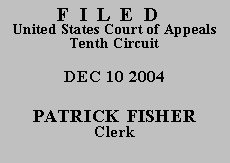

| HOMER GENE EARTHMAN,
vs.
REGINALD HINES |
|
By June 2000 Mr. Earthman had been convicted of two or more felonies. Then, on June 9, 2000, an Oklahoma jury convicted Mr. Earthman of three counts of forgery in the second degree, three counts of attempting to obtain money under false pretenses, one count of obtaining money under false pretenses, and two counts of concealing stolen property. Mr. Earthman was sentenced to 55 years for each count, to be served consecutively, for a total of 495 years imprisonment. The Oklahoma Court of Criminal Appeals ("OCCA") affirmed his conviction on July 17, 2001. On October 22, 2002, Mr. Earthman filed an application for post-conviction relief in state district court.
On June 29, 2000 in a separate proceeding, an Oklahoma jury convicted Mr. Earthman of five counts of obtaining money under false pretenses and one count of attempting to obtain money under false pretenses. Mr. Earthman was sentenced to 47 years for each count, to be served consecutively, for a total of 282 years imprisonment. The OCCA affirmed his conviction on July 26, 2001. On October 22, 2002, Mr. Earthman filed an application for post-conviction relief in state district court.
Mr. Earthman initiated two separate petitions challenging the convictions in each case no earlier than April 23, 2004.(*) The magistrate judges to whom the cases were referred recommended that the district court dismiss the actions as time-barred, determining that Mr. Earthman was not entitled to statutory or equitable tolling of the one-year limitations period of 28 U.S.C. § 2244(d)(1). Over Mr. Earthman's objections, the district court adopted the magistrate judges' reports and recommendations and dismissed both petitions. After appealing both dismissals, Mr. Earthman's motion to consolidate the appeals was granted. Fed. R. App. P. 3.
Pursuant to the Antiterrorism and Effective Death Penalty Act of 1996 ("AEDPA"), a state prisoner generally has one year from the date his conviction becomes final to file a petition for writ of habeas corpus in federal court. See 28 U.S.C. § 2244(d)(1). Mr. Earthman's June 9, 2000 conviction became final on October 17, 2001, ninety days after the OCCA affirmed his conviction. Locke v. Saffle, 237 F.3d 1269, 1272 (10th Cir. 2001). No statutory tolling occurred with regard to the June 9, 2000 conviction because Mr. Earthman failed to file a post-conviction action in the state district court until October 22, 2002, five days after the expiration of the one-year limitation period. Thus, under § 2244(d)(1), Mr. Earthman had until October 17, 2002 to file his federal habeas petition to challenge the June 9, 2000 conviction. As noted above, Mr. Earthman initiated both actions no earlier than April 23, 2004.
Similarly, Mr. Earthman's June 29, 2000 conviction would have become final on October 26, 2001, ninety days after the OCCA affirmed his conviction. However, Mr. Earthman filed an application for post-conviction relief on October 22, 2002, prior to the expiration of the limitations period on a habeas action. The state court denied relief on January 7, 2003, and Mr. Earthman filed a Petition in Error with the OCCA. This petition was denied on May 6, 2003. Thus, since AEDPA provides that "[t]he time during which a properly filed application for State post-conviction or other collateral review . . . is pending shall not be counted toward any period of limitation," 28 U.S.C. § 2244(d)(2), the limitation period was tolled from October 22, 2002 to May 6, 2003. As noted above, Mr. Earthman initiated both actions no earlier than April 23, 2004. Consequently, in the absence of equitable tolling, both of Mr. Earthman's petitions are untimely.
Where a district court denies a habeas petition on procedural grounds, a COA should issue only if the prisoner can show that "jurists of reason would find it debatable whether the petition states a valid claim of the denial of a constitutional right and that jurists of reason would find it debatable whether the district court was correct in its procedural ruling." Slack v. McDaniel, 529 U.S. 473, 484 (2000). We need not reach the former issue, however, because the record establishes that petitioner's habeas corpus claims are untimely. Thus, the district court's ruling was procedurally correct, and COA is not warranted.
Mr. Earthman recognizes that his petitions have been untimely filed, and he argues that the one-year limitation period should be equitably tolled. We have held that equitable tolling is available only in "rare and exceptional circumstances," Gibson v. Klinger, 232 F.3d 799, 808 (10th Cir. 2000) (citation omitted), and that for equitable tolling to apply, an inmate must "diligently pursue[] his claims and demonstrate[] that the failure to timely file was caused by extraordinary circumstances beyond his control." Marsh v. Soares, 223 F.3d 1217, 1220 (10th Cir. 2000). In discussing each of Mr. Earthman's arguments that the limitations period should be tolled, the magistrate judges held that equitable tolling was not available. Specifically, the magistrate judges held that Mr. Earthman failed to establish the existence of "extraordinary circumstances" justifying the application of equitable tolling, and that in any case, Mr. Earthman did not diligently pursue his claims. After carefully reviewing the magistrate judges' reports and recommendations, the district court's orders of dismissal, and the record on appeal, we are satisfied that the district court's conclusions are not reasonably debatable given the difficult legal standard applicable to equitable tolling.
Petitioner's motion to proceed in forma pauperis is GRANTED, petitioner's motion for a certificate of appealability is DENIED, and this consolidated appeal is
DISMISSED.
Entered for the Court
Paul J. Kelly, Jr.
Circuit Judge
*. The petition is deemed filed when Mr. Earthman gave it to prison authorities for mailing. Houston v. Lack, 487 U.S. 266, 270 (1988); Hoggro v. Boone, 150 F.3d 1223, 1226 n.3 (10th Cir. 1998). We assume arguendo that Mr. Earthman submitted the petition for mailing the same day that he verified it. See United States v. Gray, 182 F.3d 762, 766 (10th Cir. 1999).